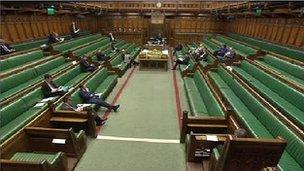Frustrating Fridays?
- Published
- comments
Another Friday, another Commons delaying action; there's been a lot of this lately and tempers have started to fray.
I was once reproved by Tory awkward squaddie Philip Davies for using the words "on and on he droned" to describe one of his regular speeches in the Commons Friday debates on private members' bills.
It was cruel but fair.
When the point of a speech is, as much as anything, to absorb time, there's a limit to how easy it can be to listen to. But, to paraphrase Gordon Brown, it's droning with a purpose.
For Mr Davies, these speeches are part of an exercise in legislative hygiene. He is one of a group of Tory backbenchers out to stop what they regard as flabby, vexatious legislation getting onto the statute book, by using the Commons rules of debate to prevent them being put to a vote.

The Commons chamber on a Friday: events can be a source of annoyance for some MPs
The rules for private members' bills don't limit how long MPs can speak, so if their speeches are long enough, they can use up all the time and the bill dies because time has run out. It's called "talking out" in the trade.
All they have to do is stay on point and avoid hesitation, repetition, deviation etc - if they don't the chair has to rein them in, which is what prompted last week's spectacular clash between Philip Davies and the Deputy Speaker Dawn Primarolo. (And incidentally it's only a filibuster if it's not in order - as ruled by the chair).
You can even stretch out the votes; legend has it that a group of hardcore Labour MPs once constructed a fortress blocking the No lobby, using bound copies of Hansard. Last week Sarah Teather's bill to outlaw so-called revenge evictions was pole-axed by talking out - prompting much chuntering about how outrageous it was for the will of the House to be frustrated by a few backbenchers employing smart procedural tactics.
To which my answer is that - whatever the merits of the bill in question - if the House wants it, the House has to make the supreme sacrifice of turning up on a Friday to vote for it.
Because the kind of tactics employed by Messrs Davies, Chope, Nuttall and Rees-Mogg (who're the hardcore practitioners of this kind of manoeuvre) can be beaten if 100 MPs vote for a "closure motion" which forces the issue to a vote.
The effect of the current rules is that unless a bill commands unanimous support, or can attract a large contingent of supporters to attend, a small group of MPs can stop it - and surely that is as it should be. It can't be right for MPs' pet schemes for the betterment of mankind to be simply waved through on a somnolent Friday morning, with half a dozen Honourable Members in the Chamber.
It's quite a good rough and ready test for whether a bill really matters - can it attract those 100 MPs in, when there's the competing call of constituency business?
The current crop of private members' bills has been unusually capital P political. Michael Moore's International Development Bill - which would commit this country to spend 0.7% of national income on international aid - is clearly very unpopular with some Conservatives (including the foreign secretary), but has support from plenty more (including the current and previous international development secretaries) and cross-party support from Labour and the Lib Dems.
Then there was Andrew George's bill to take the edge off the government's Housing Benefit changes (damned by Labour as "the bedroom tax") and Bob Neill's EU Referendum Bill - all of which saw intricate procedural battles with lots of MPs staying on that extra day.
And with that election looming, and many MPs feeling the hot breath of rival candidates on the back of their neck, it's become harder and harder to lure them away from what might be crucial constituency time.
There is some talk of changing the rules for private members bills so that second reading debates, at least, are time-limited and a vote is guaranteed at the end. It might at least end the absurd situation where supporters of a bill feel they can't speak - or that they must gabble through any comments they have to make - so they don't absorb vital time.
And there's also a suggestion that the final stage, third reading, should be taken on a weekday evening, to ensure more MPs are around. That suggestion from the Commons Procedure Committee is currently floating undebated in parliamentary limbo - but recent filibustering events may force it to the surface.
But my point is that however annoying other MPs may find the Davies/Chope axis, they are entirely within their rights and the rules to fight their ideological corner - it's the golden rule of politics: decisions are taken (or blocked) by those who show up.